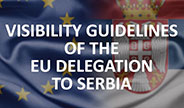Eleven experts from throughout Serbia joined on Wednesday, May 14 the Team Europe that marked first anniversary of its work and discussed various methods in which experts from different fields can bring Serbian citizens closer to the idea of European integrations and the EU accession process.
New members from Zaječar, Beograd, Novi Sad, Novi Pazar, Kragujevac and Vranje introduced themselves to the Team, detailing the distinguishing characteristics of the areas they cover, and motives behind their joining the Team Europe Serbia. Alongside with 19 old members who continue their work, the Team now consists of 30 independent experts.
Given the start of the EU accession negotiations, a year after the Team Europe was formed decision has been made about expanding it with new fields of expertise, so as to cover all the areas included in negotiation process.

Head of Information, Communication and Press of the EU Delegation to Serbia Ramūnas Janušauskas, Assistant Director of the European Integration Office Ivana Đurić, Ivana Ponjavic of Serbia’s negotiating team and Davor Glavaš of the EU Info Centre addressed the team members.
The main challenge that the Team will face in years to come is to inform as many citizens as possible about EU integrations, as well as to keep up the pace with accession talks and explain the people throughout Serbia practical implications of the progress on their everyday life.
Team members are expected to take part in lectures, conferences, seminars, youth festivals, as well as to appear in the media – so to inform the Serbian public on European Union’s policies and the very negotiating chapters through public appearances.
Team Europe Serbia was established in May 2013 in order to contribute to citizens’ better understanding of the EU and accession negotiations as well as to inform them on practical issues related to the EU membership.
The Team consists of independent experts in fields of the EU history, institutions and decision making processes within the Union, EU’s human rights, democracy and minorities policy, as well as the fields of business, ecology, agriculture, food safety, culture, education and media.




